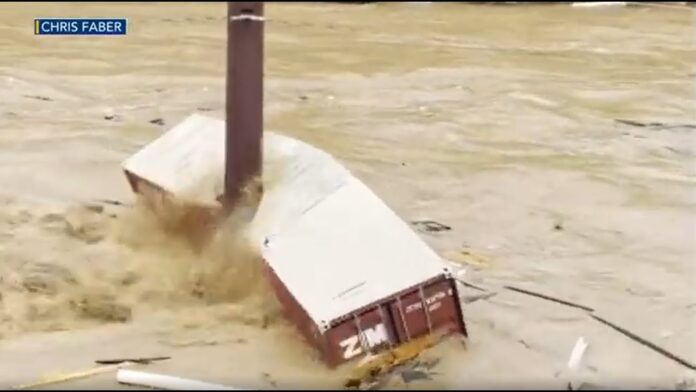Communities grapple with loss and devastation as recovery efforts ramp up following one of the deadliest Hurricanes in recent history
Hurricane Helene unleashed its fury on western North Carolina on September 27, 2024, leaving towns in ruins and families shattered. The storm made landfall as a Category 4 hurricane, initially hitting Florida’s Big Bend before carving a path of destruction through the southern Appalachian region. As reports emerge from affected areas, the scale of the devastation becomes alarmingly clear, with hundreds still missing and more than 230 lives claimed across six states.
Among the most heartbreaking stories is that of Kim and Rod Ashby, who were at their home in Elk Park, North Carolina, when the floodwaters surged. On that fateful day, the couple had just begun their morning routine when the rising waters engulfed their property. Their home, built on sturdy pillars nearly 20 feet high, was thought to be a safe haven. However, the reality of the storm was far grimmer than anyone anticipated.
Witnesses captured harrowing images of the Ashbys’ home being swept away by the Elk River as it transformed into a raging torrent. Rod Ashby clung to his wife and their three dogs, desperately trying to stay afloat. In the chaos, they clutched an old mattress before finding themselves separated by the tumultuous waters. “That’s the last time anyone saw my mum,” recounted Jessica Meidinger, Kim’s daughter, as she mourned her mother’s disappearance. While Rod survived, he has endured the agony of searching for his beloved wife, calling out her name along the riverbank.
As of now, Kim Ashby is one of hundreds still unaccounted for. The death toll continues to rise, with over 100 fatalities reported in North Carolina alone. The tragedy of Helene extends beyond the Ashbys, with entire communities ravaged and countless residents grappling with their own losses.
In Asheville, the situation is equally dire. This bustling city, located at the foot of the Blue Ridge Mountains, bore the brunt of the storm’s wrath. Mayor Lillian Govus has confirmed that Buncombe County has recorded at least 72 deaths, making it the hardest-hit area in the state. Authorities have suspended updates on the death toll, awaiting additional support to aid in the grim task of recovery. Many residents have been left stranded or missing, compounding the sense of loss that has enveloped the community.
Throughout the region, the stench of decay lingers in the air, an unsettling reminder of the lives that have been lost. Local volunteer Jazmine Rodgers expressed her heartbreak as she described the overwhelming smell that haunts the streets of Asheville: “You’re driving past cities and you can smell the dead bodies.” The enormity of the loss is hard to comprehend, as entire neighbourhoods become unrecognisable.
Ashelville’s geographical layout contributed to its vulnerability. Nestled at the intersection of the French Broad and Swannanoa rivers, the city serves as a catchment area for the rain cascading down the surrounding mountains. As emergency responders grapple with the aftermath, they face a significant challenge in navigating the wreckage. Hundreds of roads and bridges have been decimated, and communication remains patchy, complicating rescue efforts.
In Chimney Rock, a small village south-east of Asheville, every structure has been either severely damaged or completely destroyed. With a population of less than 200, the once-idyllic community now bears scars of devastation. Mayor Peter O’Leary lamented, “Everything you take for granted has been washed away, literally.” As locals band together to help one another, some have taken to using pack mules to deliver essential supplies to those stranded in remote areas.
The toll on human lives continues to mount, with Joseph Franklin McElroy facing a particularly poignant challenge. Living in Maggie Valley, he struggles to shield his six-year-old twins from the harsh reality of their community’s losses. Their favourite teacher—a figure they cherished like a second mother—tragically drowned during the storm. “Now we face having to tell them that this grand adventure killed their beloved teacher,” he shared, his voice heavy with emotion.
In response to the unfolding crisis, President Joe Biden has deployed additional military support to assist with recovery efforts. Over 500 troops have joined the initial deployment of 1,000, bolstering the presence of more than 6,100 National Guard members and 7,000 federal personnel. This concerted effort aims to restore order and provide aid to the beleaguered communities struggling to find their footing in the wake of Helene.
Yet, the emotional toll on residents cannot be understated. As recovery operations shift focus from search and rescue to rebuilding, many families face the reality of their lost loved ones and the daunting task of re-establishing their lives. Jessica Meidinger poignantly stated, “He wants to find Kim,” referring to Rod Ashby’s relentless pursuit of answers amid his grief.
As western North Carolina continues to navigate the aftermath of Hurricane Helene, the stories of resilience and loss resonate deeply. Each tale underscores the raw power of nature and its capacity to upend lives. Amid the destruction, communities are coming together, offering support and solidarity, as they work to rebuild and recover from one of the most catastrophic storms in recent history.
